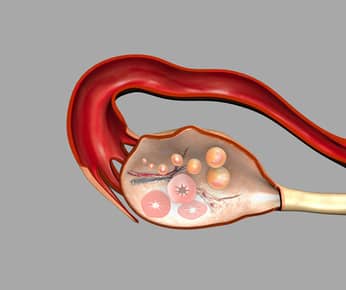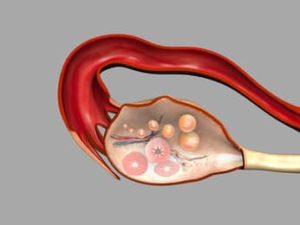
A state of intervals of more than 35 days between periods, is called oligomenorrhea (or amenorrhea, if the intervals are more than 180 days). Oligomenorrhea is typical in women with polycystic ovaries, which is a very common condition.
Normal menstrual flow is about 50 ml ± 30 ml of blood. An excess of 80 ml of blood can be caused by hormonal imbalance, uterine abnormalities (including polyp, fibroids, uterine cancer, cervical cancer, etc.) The inverse phenomenon of bleeding is usually hypomenorrhea and may be caused by the use of hormonal contraceptives (Pills, Mirna), hormonal disorder and intrauterine adhesions.
What is a Polycystic Ovarian Syndrome?
Polycystic Ovarian Syndrome or PCOS is the leading cause of irregular periods. It is a condition with many different features. The key features include:
- Menstrual cycle disturbance (usually very irregular periods)
- Hyperandrogenism (high levels of male hormones)
- Obesity
- Associations with Type 2 diabetes and cardiovascular disease
There is often overdiagnosis of PCOS, based on ultrasound alone, and there are a number of other criteria that must be matched before the diagnosis can be made.
The criteria for diagnosis include:
- Very irregular periods (or none at all)
- Clinical signs or blood tests that indicate hyperandrogenism
- Polycystic ovaries on ultrasound (25% of women without PCOS will have polycystic appearing ovaries on ultrasound)
- Excluding other causes e.g adrenal tumours
Signs of hyperandrogenism or high androgen levels include:
- Hirsutism – abnormal hair growth not consistent with a woman’s ethnic background
- Acne
- Androgenic alopecia or male pattern baldness
- Raised androgens on a blood test
The treatment and management of PCOS depend upon the patient’s goals whether that be fertility, menstrual regulation, control of high androgen levels or reducing the long term risks of PCOS. In general, weight loss is a very important part of managing PCOS.
Hirsutism and acne can be treated with cosmetic, pills or medications such as Spironolactone. Regulation of periods and prevention of endometrial overgrowth (increases the risk of development of endometrial cancer) can be treated by various hormonal contraceptives: Pills, Mirena.
Treatment of infertility, initial evaluation of both partners for the exclusion of other reasons. Treatment of PCOS infertility is given by combining weight loss and medication that regulates ovulation, such as metformin and clomifene citrate.
What are PCOS’s long-term health risk factors?
- Development of diabetes
- Cardiovascular disease
- High cholesterol
- Endometrial pathologies resulting from overgrowth, including the risk of developing uterine cancer
Hirsutism can be controlled with cosmetic methods, hormonal contraceptives or medications such as spironolactone.
Menstrual irregularity and protecting the lining of the womb from developing cancer can be achieved with various hormonal contraceptives.
Infertility requires an evaluation of both the patient and her partner as male conditions can also cause infertility. PCOS with infertility can be managed with a combination of weight loss and medications which help ovulation such as metformin and clomiphene. Occasionally, surgery is necessary as part of the evaluation.
There are long term health risks associated with PCOS. These include:
- Diabetes
- Cardiovascular disease
- High cholesterol levels
- Abnormalities of the lining of the womb which may become cancerous
FAQs
What is a polycystic ovarian syndrome?
Polycystic Ovarian Syndrome or PCOS is the leading cause of irregular periods. It is a condition with many different features. The key features include Menstrual cycle disturbance (usually very irregular periods, Hyperandrogenism (high levels of male hormones), Obesity, Associations with Type 2 diabetes and cardiovascular disease. There is often overdiagnosis of PCOS, based on ultrasound alone, but there are a number of other criteria that must be matched before the diagnosis can be made.
Does polycystic ovary syndrome cause weight gain?
Yes, one of the symptoms related to PCO is weight gain, but not all women with PCO will be overweight.
How to get pregnant if you have polycystic ovarian syndrome?
If you have PCO with irregular periods and cannot detect your ovulation time, then certain medications can be given to you to regulate your periods and ovulation. The medications that are usually used are Clomiphene citrate (Clomid) and Letrozole.
Can you develop polycystic ovarian syndrome later in life?
Yes, some women develop PCO later in life usually after gaining weight but can be due to other reasons which we still don’t know.
How to lose weight when you have a polycystic ovarian syndrome?
It is not easy to lose weight with PCO but daily physical activity and healthy eating habits are the keys. Losing weight with PCO can assist with resolving or improving the other symptoms of PCO such as irregular periods.

